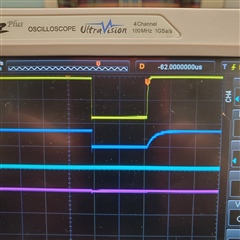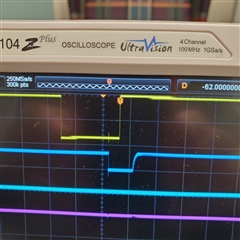So, I've built quite a few 'CC1120 RF boards', which are an exact copy of the TI recommended design with 434MHZ. I connect them up to both RX and TX boards that we designed. They work quite well and are quite reliable. On occasion, (I've had 3) I've had boards that stopped working shortly after they transmit packets. Reset the RF chip and it transmits for a few packets and stops. Unless the chip is reset, SO never goes low after CS again.
After investigation, all 3 have the same phenomenon. Before it stops, when CS goes low, SO does not follow for 30ms or so. All other boards (working boards), SO follows CS almost, if not immediately. The RF board follows the problem. So, I know its the board. I don't know if a part is wrong, but everything looks OK. I could toss the 3 boards in the trash and move on, but thought someone might have something to look at before I do that. It's odd that 3 boards (out of ~100) have the same issue. So, it's mostly like the same issue. Any ideas?



